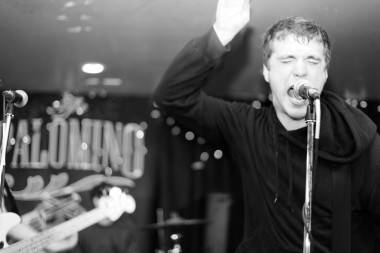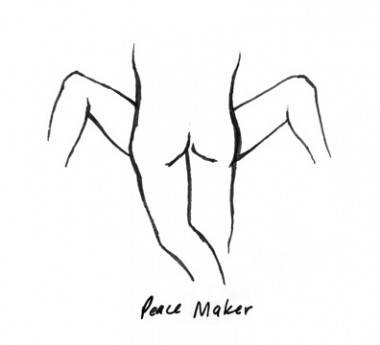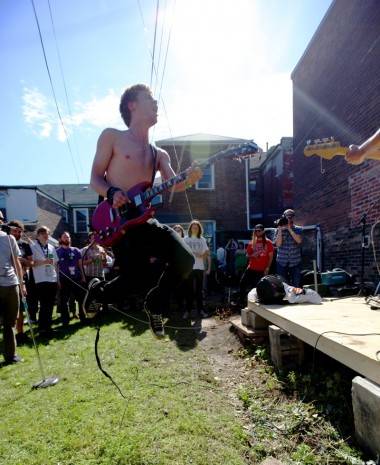Interview–Eamon McGrath
– by Shawn Conner
Eamon McGrath‘s Peace Maker was a gritty, gruff surprise, full of wonderfully raw, Replacements-like (“I’ll put on my Saturday night/You’ll put on your best clothes”) rock ‘n’ roll nuggets. The Edmonton singer/songwriter’s morning-after voice, together with the mix of sad-country inflections with propulsive electric guitar in stand-out tracks like “I Am the Deer”, made Peace Maker one of the year’s finds for this writer.
It turns out the album was actually his second “official” release, following 2009’s 13 Songs (named Album of the Year by the Ottawa Citizen), which itself was a collection of tracks McGrath had previously recorded more or less on his own.
We talked to the Toronto-based, Edmonton-raised singer/songwriter in early June about his prolific recording tendencies, working with Vancouver producers David Carswell and John Collins and the multiple meanings in the cover image of two people going at it.
McGrath plays The Zoo Shop in Vancouver June 29 (more tour dates below).
Shawn Conner: How’re you doing?
Eamon McGrath: I’m taking a couple of days off from hitting the sauce. I was completely incpacitated a couple of days ago. I was helping my boss building some stuff for a restaurant I work at. Over the course of the day we kinda just got wasted, and ended up playing baseball in the park. Thank God my girlfriend paid for a cab, and I ended up at home in our bed.
SC: You’ve been in Toronto for how long?
EM: I moved here last year with about $12 in my pocket. Before that I’d booked a tour in Europe and was debating whether to come home. I flew out here to rehearse before going overseas. Then I woke up and realized I’d been here six months. So I moved by accident. Which is the best way to do it – you end up having a lot more fun that way.
SC: What were you taking at school?
EM: I was three years into a political science degree. I kind of wish I’d taken a year off and done a lot of touring before going to school. Instead of spending that money, I probably wouldn’t have started. I’ve been a lot happier out East. There are a lot more opportunities and the infrastructure is totally different. The attitude towards music in Western Canada is a lot different.
SC: I was checking out your page on Wikipedia. You’ve released a fuck of a lot of stuff.
EM: I’ve slowed down the actual release of that stuff. A lot of that is available in low editions in Western Canada. A lot are out of print and some I don’t even have copies of. I recorded most of that in Edmonton while going to school.
I’m trying to change my approach in writing and recording. I used to be more about spur-of-the-moment, record everything you write and release everything you record. I’m trying to be more selective and to inject a little more patience into what I’m doing. Maybe in a little while I’ll go back to my old method.
SC: Your output makes me wonder if you’re a Guided by Voices fan.
EM: Totally. I love Robert Pollard [Guided by Voices frontman]. It’s the same kind of thing. Before it was sheer volume, quantity over quality, but that can speak for itself – you have this massive body of work.
SC: It’s like blogging through recording.
EM: Yeah. But now I’ve tried to change my approach. I don’t think it’s a matter of maturation, it’s just a matter of wanting to do something different. I used to have a rule that I wouldn’t do more than three takes or punch anything in. I was a sworn enemy of that for a long time. But I’m a little more open to the possibilities.
SC: Did producers Dave Carswell and John Carswell have anything to do with that?
EM: Those are the guys who’ve tried to push me in another direction, especially John. We’ve talked about the analogies between expressionist painting and punk rock, how everything is intentional. If you have a can of paint in your studio and you knock it over and it ruins your painting but you decide to leave it, that’s a statement in itself. He’s tried to show me that you can do that but be particular about the accidents you capture on tape.
The thing that’s good about John is we both grew up loving punk rock, so when he tells me to think of something in a certain way it’s never at the sake of what’s ballsy and powerful. He’s never trying to turn you into a wuss. He doesn’t want his artists to become like Steely Dan. But he does have a fascination with the details of the studio.
A lot of the songs on Peace Maker were originally more folky. A lot of those songs were totally different when I first wrote them. That method’s stayed the same – I write by recording, and when it’s time to put a big album together and go into the studio for four days I inject a new energy into what’s already been written.
SC: Who’s the female vocalist on the album?
EM: Leah Abramson, from Vancouver. I wanted female vocals on the record and she was available. She’s great at what she does, she has this Kate Bush thing to her voice. The songs are loud and heavy and her voice complements that, in a contradictory sense. She brings a softer element to it
SC: Without it being “wussy”.
EM: Yeah. And that’s down to John and Dave again, it’s not about wanting to tone down the punk rock.
SC: Tell me about the album cover for Peace Maker.
EM: That was something I saw on the wall of an art gallery while touring through Colorado. I thought it was a really awesome image. I changed it a little bit. I thought it looked like a pair of ovaries on one level, and on another it sort of looks like a crucifixtion. On another level you could be watching the conception of a child.
Also I thought about trying to take something really organic, even Taoist, and turn it into a really striking, menacing punk rock logo. That ended up becoming the goal of the record – to bridge gaps between country music like Blue Rodeo with something heavy and violent and agressive. That image became a hallmark for the sound of the album. The way I thoguht about it was the Crass logo. But really it’s just two people making love.
Watch – Eamon McGrath, “Heaven Run Me Down” (live acoustic):




